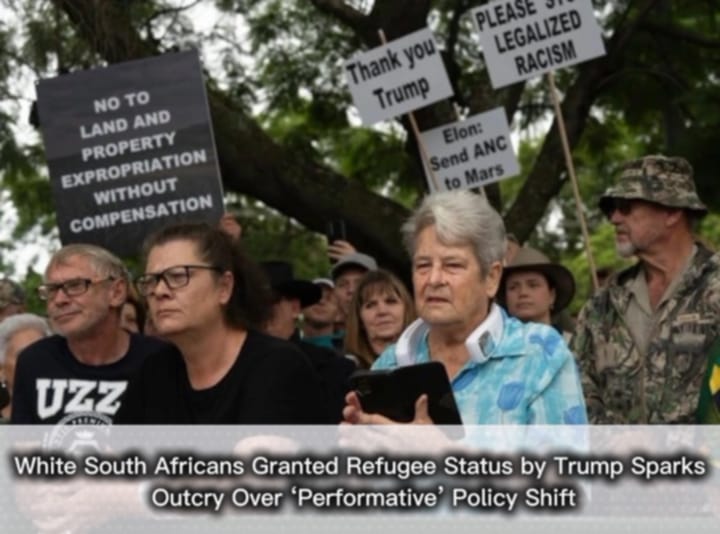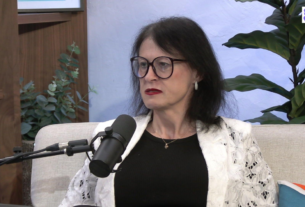Washington, D.C., May 13, 2025 – The Trump administration is facing a storm of criticism after welcoming a group of 49 white South Africans to the United States as refugees labeling them victims of racial persecution and what former President Donald Trump controversially described as “genocide.”
The group arrived at Dulles International Airport on May 12, greeted personally by Deputy Secretary of State Chris Landau, who praised their “tradition” and hardship. But the move has been condemned by human rights organizations, faith groups, and refugee advocates, who argue it politicizes and distorts refugee policy in favor of a privileged minority while shutting the door to tens of thousands fleeing genuine threats of violence and persecution.
Trump’s Dubious Genocide Claim
Trump has previously claimed that white South African farmers face “genocide” due to rising land reform efforts and violent crime claims strongly refuted by both the South African government and independent human rights groups.
“White farmers are being brutally killed,” Trump said earlier this week, justifying the special refugee status. But crime statistics and experts tell a different story.
According to Genocide Watch, white South Africans who make up about 8% of the population account for only 2% of murder victims. Black South Africans, meanwhile, face disproportionately higher levels of violence, poverty, and systemic inequality.
Mandeep Tiwana of CIVICUS, a global human rights organization based in South Africa, dismissed Trump’s claims:
“Genocide has a very clear legal definition. What is happening in South Africa does not fit that definition. In fact, white South Africans remain a privileged economic minority.”
Land Seizure and Legacy of Apartheid
Trump’s defense also leaned on South Africa’s land reform laws. In January, President Cyril Ramaphosa signed legislation allowing the government to expropriate land without compensation, a move aimed at correcting historical injustices rooted in apartheid, where the white minority seized control of most arable land.
Still, Ramaphosa has called Trump’s rhetoric a “false narrative” designed to distort the real challenges South Africa faces in balancing restitution with economic stability.
“This idea that white South Africans are being targeted for who they are is simply not supported by fact,” said Ramaphosa during a press conference last week.
Preferential Treatment Draws Backlash
Trump’s warm reception of the Afrikaner group starkly contrasts with his administration’s decision to revoke or block refugee status for people fleeing violence from countries like Haiti, Cuba, Venezuela, and Nicaragua.
Since taking office, Trump has dismantled nearly every major refugee pathway, slashed admissions, and choked off funding for traditional resettlement agencies. As a result, humanitarian organizations say refugee flows have come to a near standstill except, it seems, for white South Africans.
At Dulles Airport, Laura Thompson Osuri, executive director of Homes Without Borders, held a protest sign reading, “Afrikaners are not refugees.”
“They’re not fleeing war. They’re not fleeing state-sponsored violence,” Osuri said. “It’s just performative. It’s a political stunt that undermines the real purpose of refugee protections.”
Faith Groups Join in Protest
Even faith-based organizations historically among the strongest allies of refugee resettlement are withdrawing in protest.
The Episcopal Church’s migration ministry announced it would terminate all its refugee resettlement agreements after being asked to help with the Afrikaner group. Presiding Bishop Sean Rowe issued a searing letter on Monday:
“It has been painful to watch one group of refugees, selected in a highly unusual manner, receive preferential treatment over many others who have been waiting in refugee camps or dangerous conditions for years.”
Critics Call for a Reset
Human rights advocates warn that Trump’s selective use of refugee policy could set a dangerous precedent weaponizing the asylum system for political gain and racial bias.
“This move is not about protecting the vulnerable,” said Lena Simet of Human Rights Watch. “It’s about upholding a narrative that feeds xenophobia while abandoning our responsibilities to those truly at risk.”
As global displacement reaches record highs, with over 100 million people forcibly displaced worldwide, critics say the U.S. must return to a non-discriminatory, evidence-based refugee system not one driven by political theatrics or race-based preferences.
Whether the arrival of these 49 white South Africans marks a one-off decision or a broader policy shift remains to be seen. What is clear, however, is that the Trump administration’s embrace of a privileged minority, while slamming the door on others in dire need, has reignited fierce debate over who truly counts as a refugee and who gets to decide.




